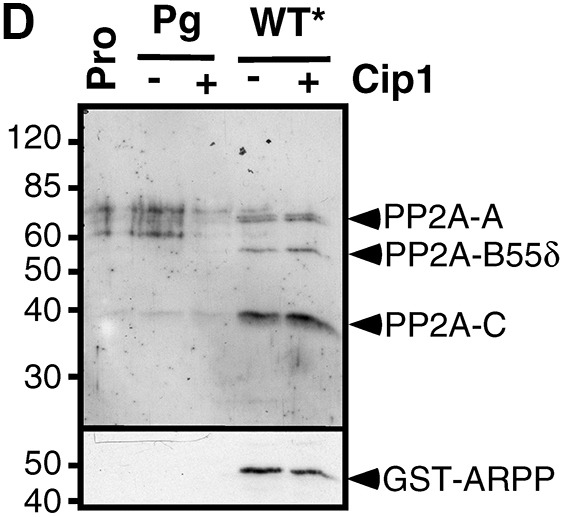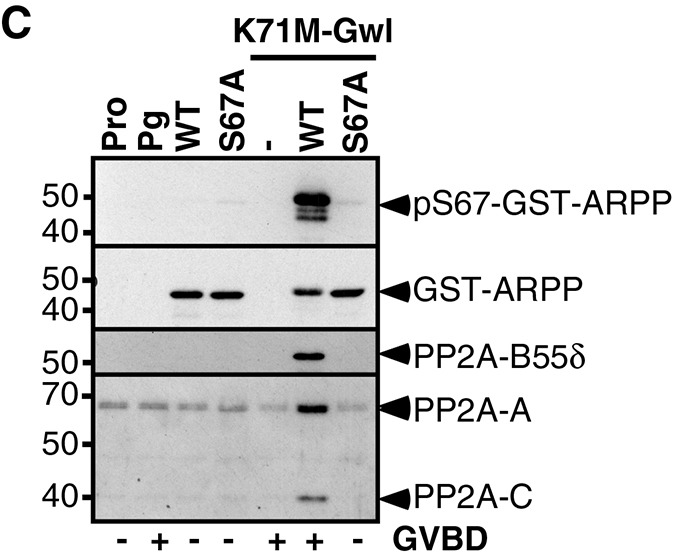Journal of Cell Science was made aware by a reader of issues regarding background cloning in Fig. 4D in J. Cell Sci. (2013) 126, 3916-3926 (doi:10.1242/jcs.126599).
Fig. 4.

Phosphorylation of ARPP19 at S67 is sufficient to promote its interaction with PP2A and the induction of meiotic maturation. (D) Western blot analysis of PP2A-A, PP2A-C, PP2A-B55δ and GST (GST-ARPP) in GST pull-down fractions corresponding to experiment (C).
The journal contacted the authors, who said that keratin spots in two control lanes of Fig. 4D had been blurred. After discussion with the corresponding author, Olivier Haccard, the journal referred this matter to Université Pierre et Marie Curie (UPMC, now Sorbonne Université). The UPMC committee decided that the conclusions of the paper were not affected by the error and recommended correction of the paper (full reports available at: http://www2.cnrs.fr/sites/communique/fichier/rapport_conclusions.pdf and http://www2.cnrs.fr/sites/communique/fichier/rapport_analyse_detaillee.pdf).
The editorial policies of Journal of Cell Science state that: “Should an error appear in a published article that affects scientific meaning or author credibility but does not affect the overall results and conclusions of the paper, our policy is to publish a Correction…” and that a Retraction should be published when “…a published paper contain[s] one or more significant errors or inaccuracies that change the overall results and conclusions of the paper…”. Journal of Cell Science follows the guidelines of the Committee on Publication Ethics (COPE), which state: “Retraction should usually be reserved for publications that are so seriously flawed (for whatever reason) that their findings or conclusions should not be relied upon”. The standards of figure assembly and data presentation in this paper fall short of good scientific practice. However, given that the investigating committee at UPMC decided that the conclusions of the paper were not affected by the errors, the appropriate course of action – according to COPE guidelines – is to publish a Correction, which the journal has made as detailed as possible.
The original blot for Fig. 4D was available and the corrected figure panel is shown below.
During analysis of the original data for the UPMC investigating committee, the authors also found a problem with Fig. 2C. The autoradiographic films used did not arise from the samples illustrated in Fig. 2B. Although this error did not affect the overall scientific conclusions, the authors would like to correct this panel as shown below.
Fig. 2.

Phosphorylation of ARPP19 at S67 depends on activation of Gwl during resumption of meiosis. (C) Western blot analysis was performed on GST pull-down fractions corresponding to experiment (B) for S67-phosphorylated GST-ARPP (pS67-GST-ARPP), PP2A-A, PP2A-C, PP2A-B55δ and GST (GST-ARPP).
Readers should note that, in addition to a splice in Fig. S4, which was highlighted by a reader, there are several other instances of unmarked splicing of lanes in western blots in this paper. The authors state that splicing was performed solely for presentation purposes, and provided the journal with all the original data from which the figures were assembled. Although such unindicated splicing is not acceptable by today's standards, it was still widespread in 2013 when this paper was published. Journal of Cell Science guidelines for figure preparation regarding splicing were introduced early in 2013, after this paper was accepted.
The authors apologise to the journal and readers for the errors.
Journal of Cell Science refers readers to other notices related to the UPMC investigation:


